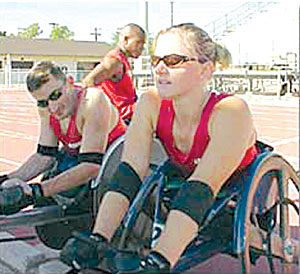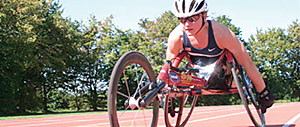 |
|
Photo courtesy of UANews
|
Blauwet arrived at the UA when the wheelchair racing program was in its infancy, "but by the time I left, we were a strong team".��
|
|
|
By Zach Collick
Arizona Daily Wildcat
Wednesday, August 3, 2005
Print this
Even though she won this year's Boston Marathon and received gold medals in two different Olympic Games, former UA Adaptive Atheletes phenom Cheri Blauwet considered herself a mediocre athlete prior to attending UA.
Now a third-year medical student at Stanford University, Blauwet came to the UA from a small high school in Iowa and grew up without a great deal of exposure to competitive wheelchair racing.
Once she got to the UA, however, specialized training, intensive team practices with the UA Adaptive Athletics Program and coaching from the likes of former Track and Field head coach Derek Brown led Blauwet to compete and win competitions both nationally and internationally.
"Once I got to the UA and had the resources to receive coaching every day and train with other teammates, I was able to progress very quickly into an internationally competitive level," Blauwet said. "I stayed on track and have now eventually ended up where I am today, and to know that I made it here through hard work and a great deal of support makes my wins that much more meaningful."
Blauwet was a silver and bronze winner in the 2000 Paralympic Games in Sydney and won the gold medal in the 800-meter event in the 2004 Paralympic Games in Athens.
A champion both inside and outside the classroom, Blauwet, a UA alum, maintained a 4.0 in molecular and cellular biology while at UA, and has Brown and the UA's Adaptive Athletics Program to thank for her four-year run at the UA.
"Coming to the University of Arizona and being a part of the Adaptive Athletics Program helped me to shape the development of my career and began to show me what was possible," Blauwet said.
Brown, the current Adaptive Athletics men's and women's head basketball coach, said Blauwet brought a lot of noteriety to a fledgling Adaptive Athletics track program and helped bridge the gap with the rest of the university.
Once a sprinter of middle distance races for 10k and 15k competitions, Brown said Blauwet's maturation and dedication to racing led to her start of more distance and marathon running before graduating from the UA.
"I saw her talent skyrocket and felt this was a natural progression," said Brown, adding that a lot of wheelchair racers do this to test their athleticism.
 |
|
Photo courtesy of UANews
|
Former UA Adaptive Atheletes wheelchair racer Cheri Blauwet won this year's Boston Marathon and received medals in two different Olympic Games.
|
|
|
Blauwet went from athlete to an assistant coach for the track team during her senior year. She helped set great examples for her teammates and had a great sense of discipline with the position on top of attending school, Brown said
"She has a great work ethic and will definitely be a force to be reckoned with for a long time with that discipline and motivation," Brown said.
Blauwet said she feels good about the legacy she's left at the UA.
"When I first came here, the wheelchair racing program was really in its fledgling stages, but by the time I left, we were a strong team with athletes from around the country and had begun to receive more support from the university," Blauwet said. "I continue to hear of both the success and struggles of the team and it makes me miss having such a strong community of athletes with disabilities all in one place."
Still looking for its niche at the UA, Blauwet said the Adaptive Athletics Program continues scheming with the university as to how disabled athletes get to utilize varsity workout facilities and resources, and have its students receive scholarship opportunities so that they can support their athletic and academic careers simultaneously.
Blauwet said being in a wheelchair had nothing to do with her success or lack of success in a race.
"I see using a chair to race, rather than running it on two legs, as simply another small physical characteristic that defines how I do the sport. It neither legitimizes or delegitimizes it in my eyes or the eyes of my able-bodied counterparts," Blauwet said. "It's taken me almost my entire life to fully realize this, but if people see what I do as inspiring, that's fine; I have no right to stop them from feeling that way and I don't consider it to be a negative thing."
Blauwet said she will continue to race through the fall and then plans to step away from racing for most of 2006 to focus on school. Depending on how she feels about the decision, Blauwet said she may retire permanently or come back to compete in the 2008 Paralympic Games in Beijing.
"I race to race; to feel the wind at my face and to feel the thrill of passing another passing competitor 10 feet from the finish," Blauwet said. "I don't race to give myself a pat on the back."
